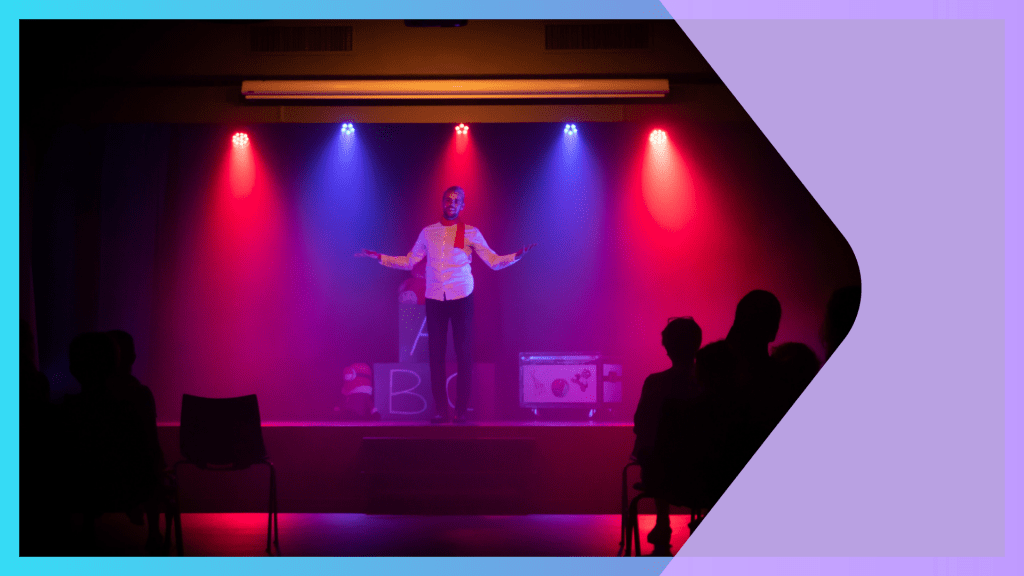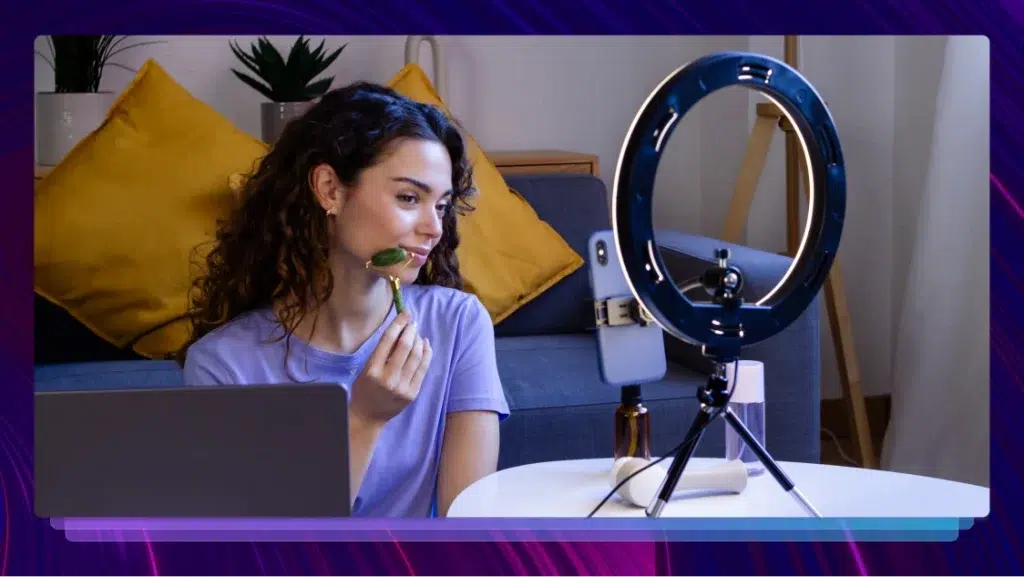How to Get Transcripts of Your Stand-up Comedy Routines to Grow Your Following
Can getting a transcript of your stand-up comedy routine help you grow your following? In this article, we discuss nine ways it can!

For comedians, nothing beats the power of stepping up to the microphone and bringing the crowd into your world. But what if you could take your stand-up comedy to the next level, without needing to revamp your act entirely? It’s absolutely within reach and it’s something you may have never even considered: creating a transcript of your stand-up comedy routine.
Transcription has plenty of benefits in general, but it can be particularly helpful for standup comedians. Ready to learn more? Here’s a quick overview of what we’ll cover:
- What Does Transcription Mean?
- What is Verbatim Transcription?
- How to Get Audio Transcribed
- What’s the Price?
- 9 Reasons to Use a Transcription of Your Comedy Standup Routines to Grow Your Following
- Why is it so Important to Grow a Big Following in the Comedy Industry?
What Does Transcription Mean?
Before we get into whether transcription can help in the comedy world, we need to define just what transcription is. You may hear the term in biology, but for our purposes, we’re going to stick with the writing definition.
Transcription involves making a written copy of something. When we transcribe an audio track – like a recording of one of your standup sets – we’re putting the words down, either on a physical piece of paper, or more likely, on the Internet.
Now, transcribing can take a few different forms. The most common is basic transcription. In this case, your transcription won’t be entirely word for word. Certain people may not want “ums,” “ahs,” or other filler words included. False starts can also be edited out.
The other type of transcription is verbatim transcription. And it just might be a standup comedian’s best friend.
What is Verbatim Transcription?
Verbatim transcription is a word-for-word written copy of an audio file. And we do mean every word. For most purposes, you’ll want cleaner copy, devoid of filler words that you might mutter while you’re telling a joke or setting up a story.
For standup, though, verbatim transcription can be a handy tool. Audiences appreciate when they can relate to comedy. They understand that telling a story may include some additional words, like the occasional “umm” or “you know.” That gives a sense of authenticity to your transcription.
You can study your transcription to see if there are certain areas of your set where you’re relying more on filler words.
It’s also beneficial for tightening up your set. The occasional filler word is fine, but too many can derail a story. You can study your transcription to see if there are certain areas of your set where you’re relying more on filler words.
How to get an Audio Transcript
When you’re finished on stage, you could go through your recording and scribble down the words from your set. But after a performance, is that really something you want to do?
Instead, you can make life much simpler with transcription from Rev. Rev is highly accurate, guaranteeing a 99 percent accuracy rate on transcribing and captioning. And if you notice any discrepancies, they’re happy to work with you.
The best part? They can transcribe both audio and video. If your set happens to be an .mp3 audio-only recording, you’ll get the same great results as if you had a multi-camera half-hour special recording. Combine that with a super quick turnaround time – up to 12 hours, and usually much faster than that – and you won’t find a better service.
What’s the Price of Getting a Transcript?
Good news: you can use Rev without needing to be a multimillionaire. At the cost of just $1 per minute of audio (with an additional 25 cents if you go the verbatim route), you’re not breaking the bank while saving a ton of time.
9 Reasons to Use a Transcript of Your Stand-up Comedy Routines to Grow Your Following
Now that you’ve seen how easy transcription really is, we can dive into the power it has. No matter what stage your career is at, you can build your following via transcribing your work. Here are 9 reasons to use a transcription of your comedy standup routines to grow your following.
1. Improve Your Website SEO = More Organic Traffic
Google scours websites for text to promote in their search engines. That’s called search engine optimization, or SEO. If your routine is transcribed, you’re already ahead of the game. People searching for any topic you cover in your set might now discover your website.
Someone can type a line they remember from your show, and boom – your website is the first result.
Another cool thing? Say someone saw you in a club. They can’t quite remember your name, but they remember a hilarious bit you did on sweet potatoes. They type a line they remember from your show, and boom – your website is the first result. All because you transcribed your set.
2. Access to a Larger Audience
Of course, more organic traffic means you’ll have more opportunities to reach a broader audience. Simply by having more words on your website, you’re opening up the doors to more people finding you. Better yet, your chances of backlinks increase. Say a fellow comedian wants to reference a set you did. They can easily link to it, which means anyone visiting their website now has an easy avenue to get to yours. And that’s a ton of additional eyeballs on your content.
3. Better Understand Your Joke Structures
We’ve all heard the phrase “practice makes perfect,” and that most certainly applies to telling jokes, as well. Whether you’re a master of one-liners or prefer your joke payoffs to come after a ten-minute buildup, it’s much easier to dissect your joke’s construction if you have a transcription of it. You can see where the joke should naturally flow, which areas to emphasize, and how to ensure you’re getting the biggest laughs.
4. Allow You to Deconstruct Your Routines
When you transcribe audio to text, you’re getting, in essence, a blueprint of your routine. Your stand-up comedy transcript is a powerful tool in your arsenal. Do you feel like the second half of your show isn’t nearly as strong as the first? Maybe there are a few jokes you can switch around to create more natural transitions between your bits. Or perhaps you did a few minutes specifically on a recent pop culture phenomenon; you can review your transcript to see which words most powerfully paint the picture you’re trying to convey.
5. Understand What Did Not Work
Did you think that story in the middle of your set would get a bigger laugh? Maybe you left out a key point in the setup or skipped over a crucial word in the punchline. With your work transcribed, you can clearly see where you may have gone astray and correct it for next time.
6. Work on Different Words That Connect With Different Audiences
Without a doubt, comedy can be universal. What’s funny to you is funny to different genders, ages, and beliefs. But there are plenty of jokes and stories that are more tailored to unique audiences. If you’re doing comedy in varied settings, you may find that certain words tend to resonate more for specific audiences. Maybe you have a joke about comfort food that really goes over well in southern cities, but in the north, fresh-baked biscuits and a huge bowl of grits may not land as well. By studying your transcription, you can tweak the wording to be more relatable to different audiences – and that can lead to even greater results.
7. Grow Your Audience of Non-Native Speakers
You know certain words and phrases resonate more strongly in different regions, but we can even take that a step further. Non-native speakers may not understand different kinds of slang, or if you speak quickly, they may miss a key piece of information to understand a joke fully. Rather than being left out in the cold, though, they can find the full stand-up comedy transcript on your website. Who knows? You may even teach them a new piece of slang that’s totally lit! (The most sincere apologies for using the word “lit.”)
8. Appeal to People with Hearing Disabilities
About 48 million Americans – 20 percent – report some degree of hearing loss. There are any number of reasons why someone might not fully hear your set. The acoustics could be bad. The microphone might produce an echo. There could be someone talking nearby. Or, they may not have sharp enough hearing to catch every word. But they can still get the full impact of your work if you transcribe audio to text. Getting someone to laugh is a great feeling, no matter how you do it.
9. Improve Your Punchlines
“To GET to the other side…TO! Get to THE other side…To get to the other SIDE! That’s it, that’s the one!” Coming up with the perfect punchline isn’t easy. If you do your set and never transcribe it, you’re missing out on the chance to hone your craft. Getting to see everything laid out will change the game for you, providing an opportunity to look at your punchlines and adjust to perfection.
Why is it so Important to Grow a Big Following in the Comedy Industry?
Standup comedy is a unique vehicle – comedians can share pieces of their lives through laughter. It’s hard to find that in other industries, and so it’s even more vital to focus on your goals.
Perhaps you don’t want to become someone that tours across the globe for hundreds of thousands of people each night. But that doesn’t mean you should abandon attempts to grow your following. If you can make even one more person laugh, you’re headed in the right direction.
No matter your ultimate end goal, having more people interact with your work is a good thing. A bigger following means the potential for more sets, more money, and more opportunities. And with how easy it is to get a transcription of your performance, why wouldn’t you go for it?
The Final Word on Getting A Transcript of Your Stand-up Comedy Routines
From honing your craft to expanding your following, there are plenty of reasons to transcribe your standup comedy routine. You’re already working hard, and you can make sure that work gets in front of even more people who will appreciate it.
A transcription of your standup comedy routine awaits.
Heading
Heading 1
Heading 2
Heading 3
Heading 4
Heading 5
Heading 6
Lorem ipsum dolor sit amet, consectetur adipiscing elit, sed do eiusmod tempor incididunt ut labore et dolore magna aliqua. Ut enim ad minim veniam, quis nostrud exercitation ullamco laboris nisi ut aliquip ex ea commodo consequat. Duis aute irure dolor in reprehenderit in voluptate velit esse cillum dolore eu fugiat nulla pariatur.
Block quote
Ordered list
- Item 1
- Item 2
- Item 3
Unordered list
- Item A
- Item B
- Item C
Bold text
Emphasis
Superscript
Subscript

Subscribe to The Rev Blog
Sign up to get Rev content delivered straight to your inbox.




